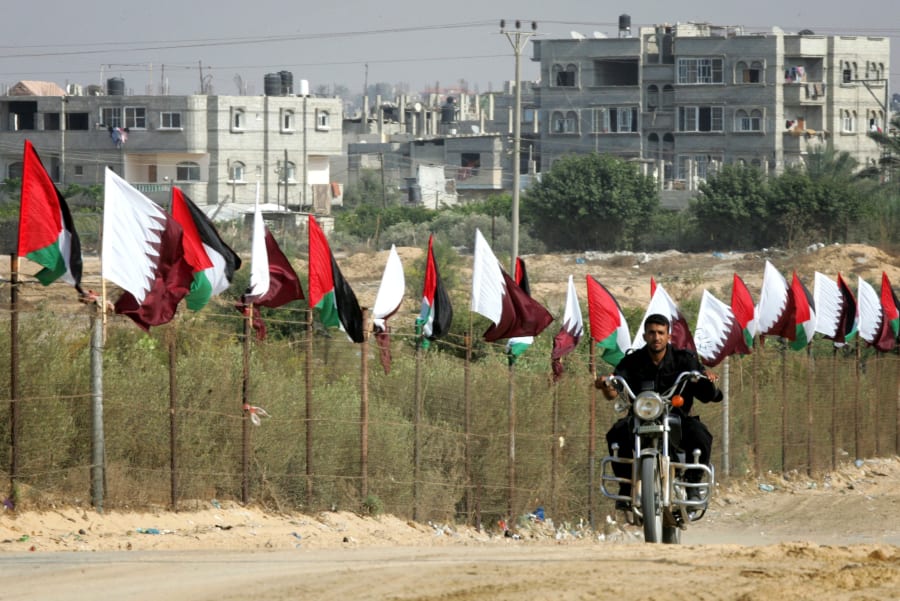‘Complex but not an enemy country?’ New documents reveal deeper level of Qatari involvement with Hamas before Oct 7 war
Revelations appear to contradict Netanyahu’s claims about Qatar’s level of involvement

Israel’s Channel 12 News has revealed internal documents and correspondence from Hamas, reportedly discovered during the Iron Swords War, indicating that Qatar has been a significant financial and strategic supporter of the Hamas terrorist organization for several years.
The documents appear to contradict recent claims by Prime Minister Benjamin Netanyahu that Qatari funding to Gaza was minimal and largely humanitarian in nature.
After coming under scrutiny for Qatari ties to individuals in his office, as well as his own role in facilitating the transfer of Qatari money into the Gaza Strip, Netanyahu recently sought to minimize Qatar’s role in supporting Hamas ahead of the Oct. 7, 2023, massacres.
Earlier in the war, when questioned about his acceptance of Qatari assistance, Netanyahu described Qatar as “a complex country, but not an enemy country.” Just two weeks ago, in an unusual press conference with Israeli media, he once again addressed the issue of Qatari funding.
“You say, ‘You transferred the Qatari money to Hamas.’ It was only a small percentage of all the money that came to Hamas,” Netanyahu claimed, saying the money was used primarily for supplies and infrastructure.
The documents indicated that the funds provided by Qatar served as a “main artery,” not only for financing the fighting in Gaza, but also for planning and carrying out the Oct. 7 attack, and for the build-up of Hamas forces outside the Gaza Strip.
Channel 12 revealed that during a 2019 meeting between then Qatari Foreign Minister Mohammed al-Thani (currently Prime Minister of Qatar) and several Hamas leaders, including the deceased Hamas political leader, Ismail Haniyeh, Haniyeh was recorded telling al-Thani that "the Qatari grant is the main artery of the movement, Hamas.”
In 2021, following Operation Guardian of the Walls, Haniyeh wrote to former Hamas military leader Yahya Sinwar, telling him that he'd met with the Emir of Qatar, who agreed to “discreet financial support” for the terror organization. Haniyeh reportedly asked Sinwar to write a letter to the Emir, “in which you focus on the military campaign, on your urgent needs, and dedicate the victory (in Guardian of the Walls) to His Highness.”
Haniyeh reportedly told Sinwar that the Qatari Emir “does not want anyone in the world to know about” his support for the group, saying that the leader had already provided $11 million to Hamas at that point.
A report from the Palestinian Authority (PA) stated that officials from Hamas’ military wing and Qatari intelligence met to oversee preparations for the training of a new Al-Qassam Brigades battalion on military bases in Turkey and Qatar, with funding for the operation provided by Qatar.
These "Return Brigades” were reportedly to consist of Palestinians who fled from Syria to Lebanon during the Syrian Civil War.
The documents also revealed that Hamas deliberately abandoned its policy of working with Egypt in order to pivot to Qatar. In correspondence between Sinwar and Haniyeh, the former stated, “The Qataris are more loyal than the Egyptians, love Hamas, and give generously.”
In addition, the documents demonstrate that, contrary to recent positive statements about Qatar by U.S. President Donald Trump and Middle East envoy Steve Witkoff, Qatar actively worked to undermine Trump’s “Deal of the Century” peace plan in his first term.
In 2019, the Qatari Emir expressed concern about Trump’s peace plan and discussed ways to prevent it. He reportedly said, "Regarding Palestine – Oman is on one side and we are on the other. Saudi Arabia, the United Arab Emirates, and Bahrain, which promote normalization with Israel, will be isolated, while Pakistan and Malaysia, which oppose normalization, are in a good position.”
Senior Hamas official Khaled Mashaal agreed, stating, “We must cooperate to oppose and thwart the Deal of the Century.”
In May 2022, Sinwar wrote to Haniyeh, emphasizing the importance of Hamas’ claim to be defending Al Quds.
“We must start immediately with our allies - Iran, Qatar and Turkey. Qatari and Turkish diplomacy must play a leading role. Our role is to make it difficult for the occupation to breathe and ensure that international actors sever ties with them,” Sinwar wrote.
In internal communications, Hamas also discussed the possibility of Qatar joining the normalization process between Israel and the Arab states, saying such a move would mean the “elimination of the Palestinian national project.”
These revelations highlight the problematic nature of the role Qatar currently plays in mediating hostage-ceasefire negotiations between Israel and Hamas.
While Qatar has previously denied supporting Hamas' military wing, documents obtained by Channel 12 suggest a more central role for Qatari support in the lead-up to the Oct. 7 attacks.
The documents provide evidence that Qatar served as a key ally to Hamas, assisted the group in preparing for the invasion of Israel, and continues to play a central and troubling role in the ongoing mediation efforts.

The All Israel News Staff is a team of journalists in Israel.
You might also like to read this:














